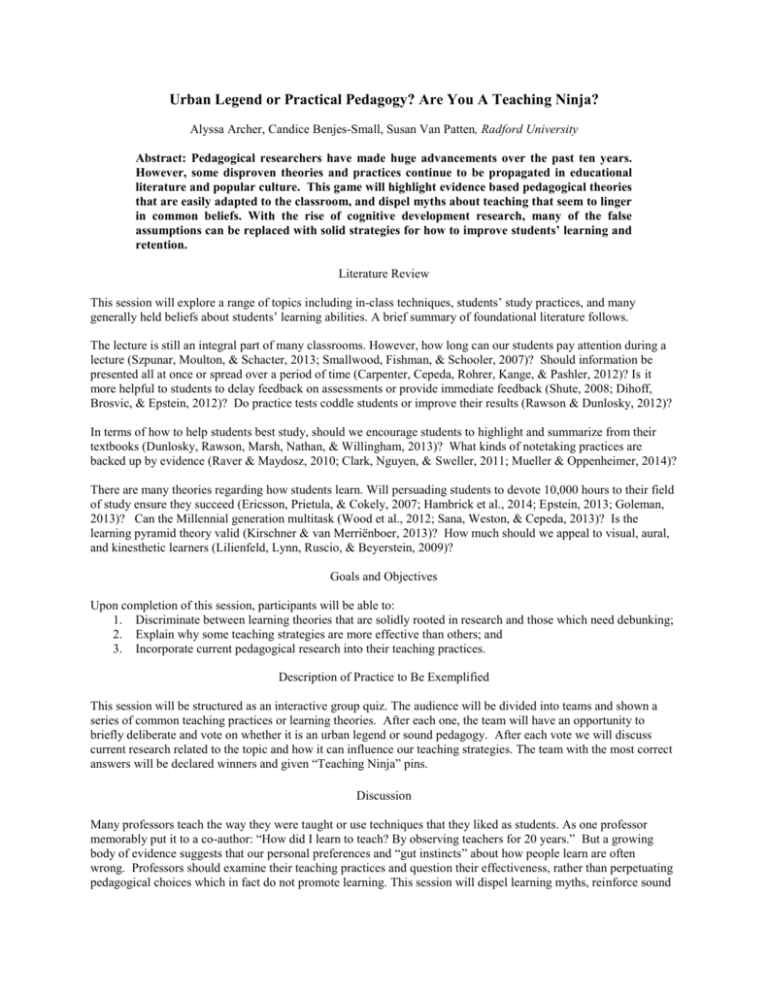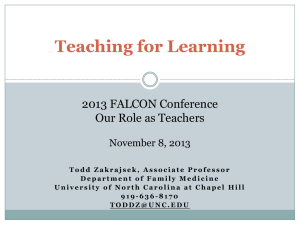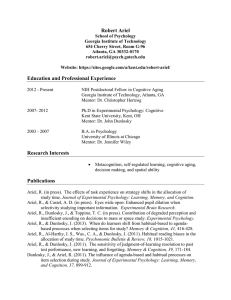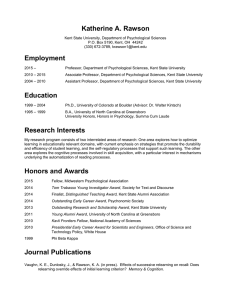2-page proposal file
advertisement

Urban Legend or Practical Pedagogy? Are You A Teaching Ninja? Alyssa Archer, Candice Benjes-Small, Susan Van Patten, Radford University Abstract: Pedagogical researchers have made huge advancements over the past ten years. However, some disproven theories and practices continue to be propagated in educational literature and popular culture. This game will highlight evidence based pedagogical theories that are easily adapted to the classroom, and dispel myths about teaching that seem to linger in common beliefs. With the rise of cognitive development research, many of the false assumptions can be replaced with solid strategies for how to improve students’ learning and retention. Literature Review This session will explore a range of topics including in-class techniques, students’ study practices, and many generally held beliefs about students’ learning abilities. A brief summary of foundational literature follows. The lecture is still an integral part of many classrooms. However, how long can our students pay attention during a lecture (Szpunar, Moulton, & Schacter, 2013; Smallwood, Fishman, & Schooler, 2007)? Should information be presented all at once or spread over a period of time (Carpenter, Cepeda, Rohrer, Kange, & Pashler, 2012)? Is it more helpful to students to delay feedback on assessments or provide immediate feedback (Shute, 2008; Dihoff, Brosvic, & Epstein, 2012)? Do practice tests coddle students or improve their results (Rawson & Dunlosky, 2012)? In terms of how to help students best study, should we encourage students to highlight and summarize from their textbooks (Dunlosky, Rawson, Marsh, Nathan, & Willingham, 2013)? What kinds of notetaking practices are backed up by evidence (Raver & Maydosz, 2010; Clark, Nguyen, & Sweller, 2011; Mueller & Oppenheimer, 2014)? There are many theories regarding how students learn. Will persuading students to devote 10,000 hours to their field of study ensure they succeed (Ericsson, Prietula, & Cokely, 2007; Hambrick et al., 2014; Epstein, 2013; Goleman, 2013)? Can the Millennial generation multitask (Wood et al., 2012; Sana, Weston, & Cepeda, 2013)? Is the learning pyramid theory valid (Kirschner & van Merriënboer, 2013)? How much should we appeal to visual, aural, and kinesthetic learners (Lilienfeld, Lynn, Ruscio, & Beyerstein, 2009)? Goals and Objectives Upon completion of this session, participants will be able to: 1. Discriminate between learning theories that are solidly rooted in research and those which need debunking; 2. Explain why some teaching strategies are more effective than others; and 3. Incorporate current pedagogical research into their teaching practices. Description of Practice to Be Exemplified This session will be structured as an interactive group quiz. The audience will be divided into teams and shown a series of common teaching practices or learning theories. After each one, the team will have an opportunity to briefly deliberate and vote on whether it is an urban legend or sound pedagogy. After each vote we will discuss current research related to the topic and how it can influence our teaching strategies. The team with the most correct answers will be declared winners and given “Teaching Ninja” pins. Discussion Many professors teach the way they were taught or use techniques that they liked as students. As one professor memorably put it to a co-author: “How did I learn to teach? By observing teachers for 20 years.” But a growing body of evidence suggests that our personal preferences and “gut instincts” about how people learn are often wrong. Professors should examine their teaching practices and question their effectiveness, rather than perpetuating pedagogical choices which in fact do not promote learning. This session will dispel learning myths, reinforce sound methods, and encourage participants to foster learning strategies supported by cognitive psychology and education research. The interactive quiz format will serve as an excellent framing device, as recent studies have shown that immediate testing and feedback is among the most effective approaches to learning (Brown, Roediger, & McDaniel, 2014). References Brown, P. C., Roediger, H. L., & McDaniel, M. A. (2014). Make it stick: The science of successful learning. Cambridge, MA: The Belknapp Press of Harvard University Press. Carpenter, S. K., Cepeda, N. J., Rohrer, D., Kang, S. H., & Pashler, H. (2012). Using spacing to enhance diverse forms of learning: Review of recent research and implications for instruction. Educational Psychology Review, 24(3), 369-378. Clark, R. C., Nguyen, F., & Sweller, J. (2011). Efficiency in learning: Evidence-based guidelines to manage cognitive load. San Francisco, CA: Pfeiffer. Dihoff, R. E., Brosvic, G. M., & Epstein, M. L. (2012). The role of feedback during academic testing: The delay retention effect revisited. The Psychological Record, 53(4), 2. Dunlosky, J., Rawson, K. A., Marsh, E. J., Nathan, M. J., & Willingham, D. T. (2013). Improving students’ learning with effective learning techniques promising directions from cognitive and educational psychology. Psychological Science in the Public Interest, 14(1), 4-58. Epstein, D. (2013). The sports gene: Inside the science of extraordinary athletic performance. New York, NY: Penguin. Ericsson, K. A., Prietula, M. J., & Cokely, E. T. (2007). The making of an expert. Harvard Business Review, 85(7/8), 114. Goleman, D. (2013). Focus: The hidden driver of excellence. New York, NY: Harper Collins. Hambrick, D. Z., Oswald, F. L., Altmann, E. M., Meinz, E. J., Gobet, F., & Campitelli, G. (2014). Deliberate practice: Is that all it takes to become an expert? Intelligence, 45, 34-45. Kirschner, P. A., & van Merriënboer, J. J. (2013). Do learners really know best? Urban legends in education. Educational Psychologist, 48(3), 169-183 Lilienfeld, S. O., Lynn, S. J., Ruscio, J., & Beyerstein, B. L. (2009). 50 great myths of popular psychology: Shattering widespread misconceptions about human behavior. West Sussex, England: John Wiley & Sons. Mueller, P. A., & Oppenheimer, D. M. (2014). The pen is mightier than the keyboard: Advantages of longhand over laptop note taking. Psychological Science, 25(6), 1159-1168. Raver, S. A., & Maydosz, A. S. (2010). Impact of the provision and timing of instructor-provided notes on university students’ learning. Active Learning in Higher Education, 11(3), 189-200. Rawson, K. A., & Dunlosky, J. (2012). When is practice testing most effective for improving the durability and efficiency of student learning?. Educational Psychology Review, 24(3), 419-435. Sana, F., Weston, T., & Cepeda, N. J. (2013). Laptop multitasking hinders classroom learning for both users and nearby peers. Computers & Education, 62, 24-31. Shute, V. J. (2008). Focus on formative feedback. Review of Educational Research, 78(1), 153-189. Smallwood, J., Fishman, D. J., & Schooler, J. W. (2007). Counting the cost of an absent mind: Mind wandering as an underrecognized influence on educational performance. Psychonomic Bulletin & Review, 14(2), 230236. Szpunar, K. K., Moulton, S. T., & Schacter, D. L. (2013). Mind wandering and education: From the classroom to online learning. Frontiers in Psychology, 4(495), 1-7. Wood, E., Zivcakova, L., Gentile, P., Archer, K., De Pasquale, D., & Nosko, A. (2012). Examining the impact of off-task multi-tasking with technology on real-time classroom learning. Computers & Education, 58(1), 365-374.






